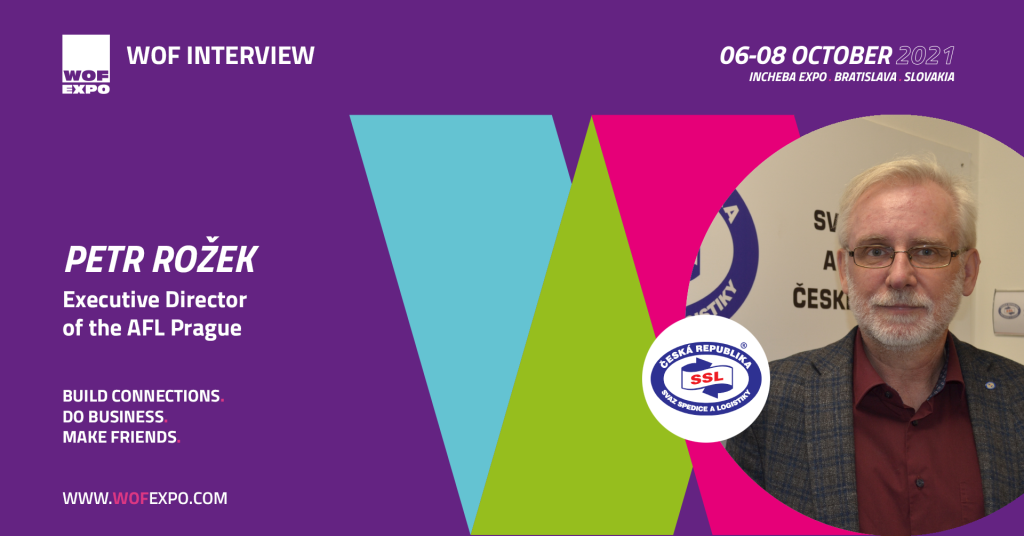Interview with Petr Rožek
| Ing. Petr Rožek, Ph.D. is the executive director of the Association of Forwarding and Logistics Czech Republic – representation of the international organization FIATA for the Czech Republic. The union has been dedicated to the issue of education of logistics experts as well as education in the field of transport. The result is the educational program Freight Forwarding FIATA. Mr. Rožek is currently the only certified INCOTERMS 2020 lecturer in the Czech Republic. He teaches Incoterms, transport, shipment insurance and sustainable development in transport and logistics. |
| 1. In line with the Green Agreement, the European Commission has decided to take a significant step in the digitization of transport. Could you briefly tell our readers what is the purpose of the eFTi regulation and when it should come into the full force? The EC Regulation on eFTi digitization has a much wider impact than just the transport and logistics sectors. The primary intention is clearly to lay a solid foundation and framework for the creation of a truly functional and compatible e-government in all EU Member States, as it is clear that this modern way of governance and communication with its citizens is evolving in each member state in virtually separate and inconsistent pace. The aim is therefore to create a unified way of communication between the governing bodies of the state and the Union and their citizens. Logistics, of course, is “happy to ride” on this wave, because of its historical experience of communication with various supervisory bodies of the state administration it is still mostly “paperbased”, ie expensive and delaying. Most industries communicate electronically on a regular basis, digital platforms and solutions based on blockchain technology are on the rise, so we are very excited when similar channels will emerge and work in our favor at the state administration level. 2. Will the carriers be able to use electronic documents across the EU then? Yes, carriers from across the EU and throughout the EU should not only be able but also be willing to use electronic documents; they will be able to use electronic communication tools, including the issuing and presentation of transport and customs documents in electronic, paperless, form, and relevant stakeholders (police, customs, local and regional authorities, but also banks, insurance companies, etc.) should be able to – and willing – to accept them with the same respect as today for printed documents. A huge step forward will be the “cross-border”, therefore the universal form and validity of these documents and channels for their creation, security features, sharing and verification across the EU. We see the great importance of this step in the field of freight forwarding, as the freight forwarder, as a transport engineer, often issues a number of documents on the basis of electronic information, which he then has to give to his customers or their partners for inspection and approval; Digitization of both the creation and the sharing of this information and documents will not only save costs and time, but also simplify and increase protection against misuse in the transmission of data and information. 3. Can you tell us whether the new eFTi regulation also applies to the eCMR system, which has been adopted by many European countries? Among other things, the eFTi regulation is a universal standard for the functioning of all business groups within the EU, so logically it includes (for example) e-CMR or e-TIR systems. However, these systems are already in operation, and the advantage of digitization is the projected compatibility of individual systems, so there is no need to worry about the threat of a running e-CMR system or a promisingly running e-TIR. However, it may be worse for projects (both of which undoubtedly belong to) that cross EU borders; If neighboring / neighboring countries are not gradually involved in the digitization process, for example by helping to implement the relevant procedures, it will be necessary – and already counting – to take into account the alternative, ie classic paper form of the document as the basic tool for communication with the competent control authorities. Within the EU, however, 100% e-CMR penetration can be expected at the latest on the date of application of the principles of the eFTi Regulation. 4. The digitization of freight transport and logistics is gaining momentum, also mainly due to the current pandemic situation. Do you think that the successful implementation of innovations will streamline logistics and the processes in it? The purpose of any innovation is, of course, to increase the efficiency and reliability of the system. In addition to the wave of greening, this was and is the supporting structure of all current projects within both Industry 4.0 and Logistics 4.0. And yes, one can say “due to the pandemic situation” and the obstacles it has set for the established procedures, these projects are moving at a higher speed ahead. The pandemic, with its limitations of movement and thus the higher need for remote communication with a secured and protected result, was not the trigger of most changes, but certainly a substantial accelerator; and, surprisingly, many of these changes are already so far and intense that it will not be possible to stop them even after the pandemic subsides and production and logistics return to normal. At the same time, however, this irreversible process must be very quickly “settled” in the widest range of users, regardless of their progress in introducing new communication and control technologies, because if there is any new element in the digitization process, it is completely and unconditionally universal scope throughout the system. The breadth of society, the unconditional involvement of all, regardless of their will or desire to participate, including penetration into the most private level of society. And we must not forget the intensive search for reliable ways to protect such widespread influence… |
 | Association of Forwarding and Logistics Czech Republic is a leading association in the transport industry of the Czech Republic. Member of FIATA, active collaborator of other similar unions and groups in the country but also abroad. Main targets are: to serve our members (185+) with the most actual information from the industry, to provide legal support, and – last but not least – to assist schools in their tuition, both in providing material and personal presence during the lessons therein.
www.svazspedice.cz |

